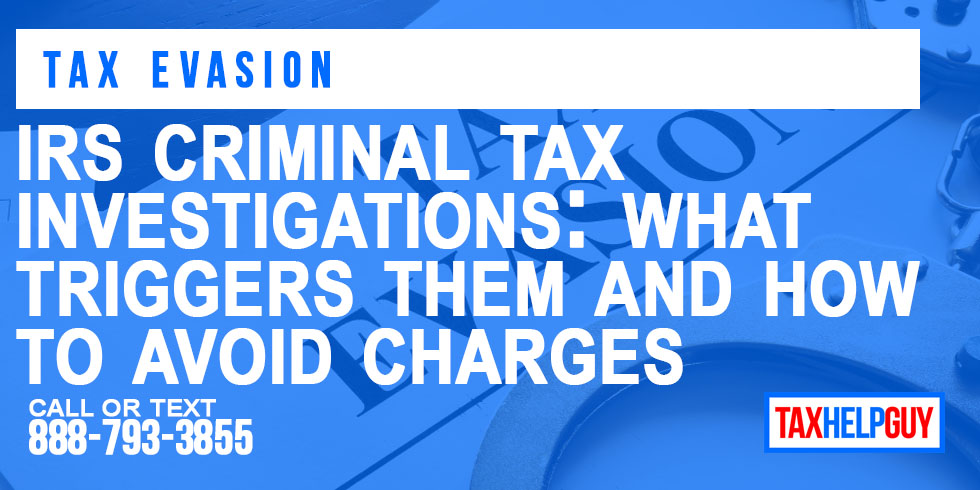Key Takeaways
- Most IRS cases are civil, but willful tax law violations—like tax fraud or evasion—can result in criminal charges.
- Common red flags include underreporting income, payroll tax fraud, and structuring cash transactions.
- Criminal charges require evidence of intent—not just negligence or mistakes.
- About 90% of DOJ-accepted IRS criminal cases result in conviction.
- Penalties include prison time, hefty fines, restitution, and reputational harm.
- Prevent problems by filing accurate returns, working with tax professionals, and responding to IRS letters promptly.
When Does the IRS Pursue Criminal Charges?
The IRS generally reserves criminal investigations for serious cases of intentional tax law violations. These include back taxes due from businesses, fraudulent filings, and ongoing noncompliance.
What Triggers IRS Criminal Investigations?
Not every tax mistake leads to jail time. However, deliberate efforts to deceive the IRS—especially involving business taxes—can lead to prosecution.
Common Triggers Include:
- Underreporting income: Failing to report substantial income from a side hustle or cash business.
- Repeated failure to file: Skipping tax filings for multiple years.
- Filing false returns: Inflating deductions or inventing dependents.
- Payroll tax fraud: Not submitting employment taxes withheld from staff.
- Structuring transactions: Breaking up cash deposits to evade reporting thresholds ($10,000).
Willful Tax Fraud vs. Honest Mistakes
The IRS distinguishes between honest mistakes and willful deceit. Criminal cases must prove intent—deliberate knowledge and action to break the law.
Types of IRS Tax Crimes
The IRS Criminal Investigation (CI) division handles various financial and tax crimes, especially those tied to back taxes owed by businesses and intentional fraud.
- Tax Evasion (26 U.S.C. § 7201): Hiding income, inflating deductions, or using offshore accounts. Up to 5 years in prison + $250,000 fine.
- Willful Failure to File (26 U.S.C. § 7203): Failing to file required returns can lead to prosecution per year missed.
- Filing False Returns (26 U.S.C. § 7206): Misleading the IRS with fraudulent information.
- Employment Tax Fraud: Common in small businesses. Not submitting withheld payroll taxes can result in criminal charges.
- FBAR Noncompliance: Willfully failing to disclose foreign accounts over $10,000.
How the IRS Pursues Criminal Cases
The process of escalating a tax issue into a criminal charge includes several steps and involves both the IRS CI and Department of Justice (DOJ).
Investigation Process:
- Audit or tip-off
- Referral to IRS CI
- Evidence gathering (interviews, subpoenas, surveillance)
- Referral to DOJ
- Indictment and prosecution
In FY2023 alone, IRS CI initiated over 2,676 cases and uncovered $37.1 billion in tax crimes, with an 88.4% conviction rate.
Penalties for IRS Criminal Convictions
- Fines & Restitution: Up to $100,000 for individuals; $500,000 for corporations.
- Prison Sentences: 1 to 5+ years depending on the offense.
- Professional Damage: Loss of licenses, reputation, and career.
Real IRS Criminal Cases
- Wesley Snipes: Failed to file tax returns (1999–2001). Served 3 years in prison for misdemeanors. Owed $17M in back taxes.
- Michael Avenatti: Convicted of tax fraud and embezzlement. Received 14 years in federal prison.
- COVID Relief Fraud: Over 1,400 cases involving fake businesses and payroll fraud. IRS recovered millions in stolen relief funds.
How to Avoid IRS Criminal Charges
- File timely and accurate returns, especially for your business taxes.
- Hire qualified tax professionals to avoid risky errors.
- Respond to IRS letters immediately—don’t ignore them.
- If you suspect you’re being investigated, consult a tax attorney right away.
What to Do If You’re Under IRS Investigation
- Don’t destroy records—it could lead to obstruction charges.
- Hire a criminal tax attorney.
- Consider voluntary disclosure if applicable.
- Know your rights: remain silent, request legal counsel.
FAQs About IRS Criminal Investigations
- Does the IRS actually press criminal charges?
- Yes, especially for willful tax fraud, evasion, or payroll fraud. Civil penalties apply to honest mistakes.
- How do I know if I’m under IRS investigation?
- Signs include special agent visits, subpoenas, or inquiries from IRS CI—not just a letter or bill.
- Can I go to jail for not filing taxes?
- Yes. Willfully failing to file is a federal offense and can result in up to one year in jail per unfiled return.
- What is the IRS conviction rate?
- IRS CI has a conviction rate of about 90% for cases prosecuted through the DOJ.
Need Help With Back Taxes or a Tax Investigation?
Although most tax issues are resolved civilly, if you owe back taxes or are facing scrutiny over your business tax filings, take action early. The IRS takes willful violations seriously, and with a 90% conviction rate, it’s crucial to protect yourself.
TaxHelpGuy.com connects you with experienced tax professionals and attorneys. We specialize in helping businesses and individuals resolve complex tax problems—including audits, back taxes, and IRS criminal investigations.


